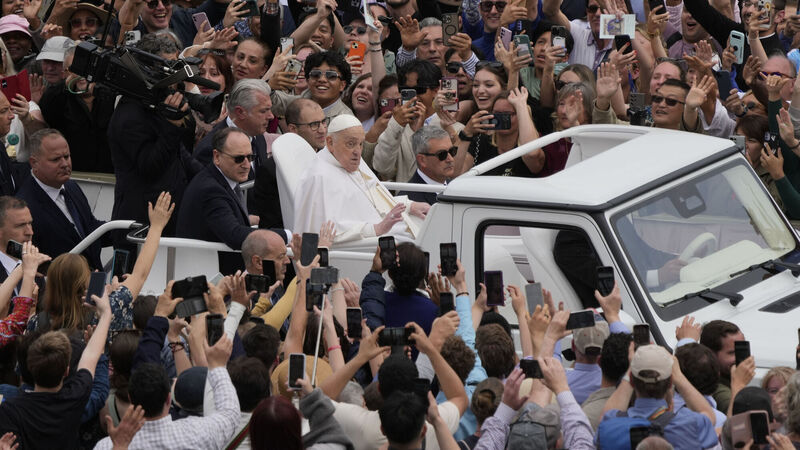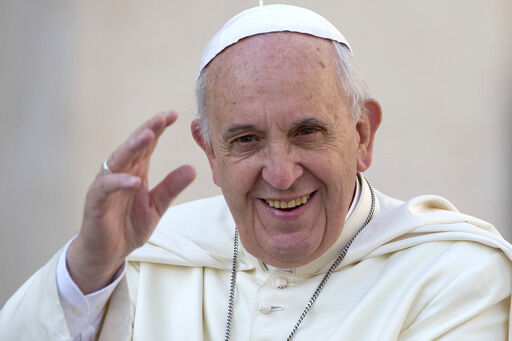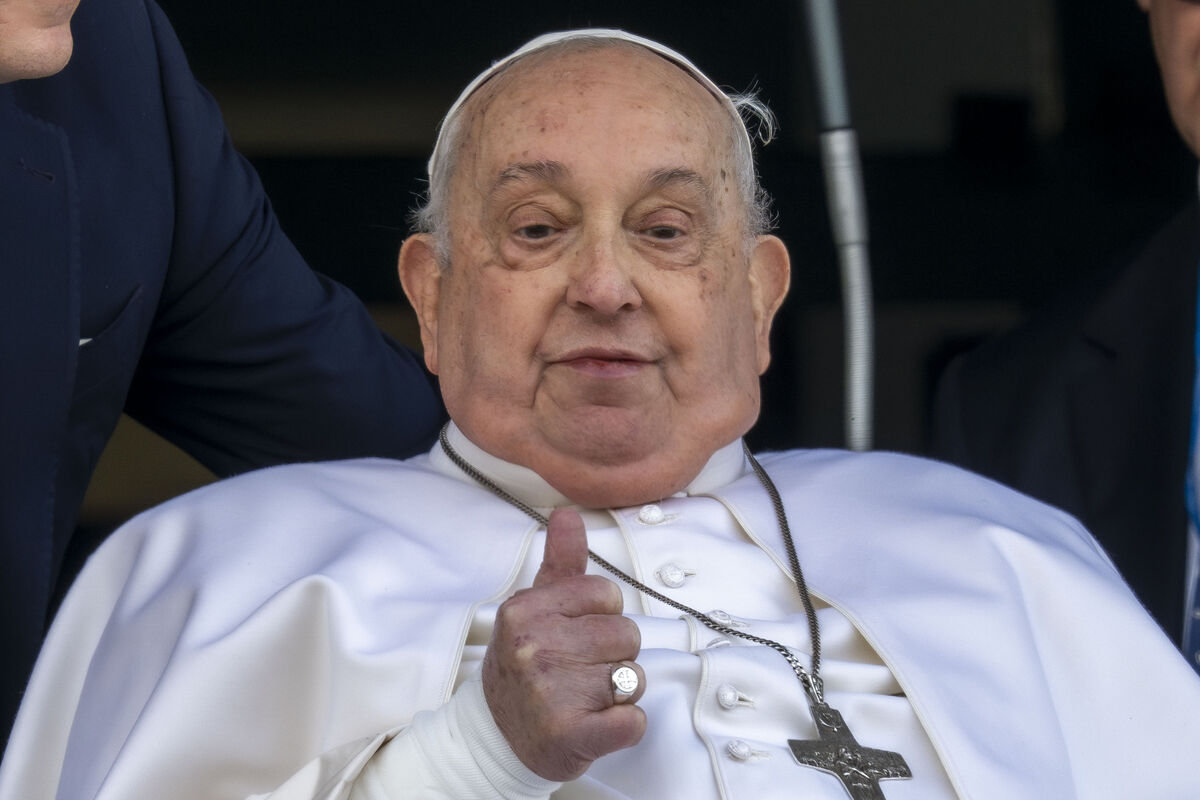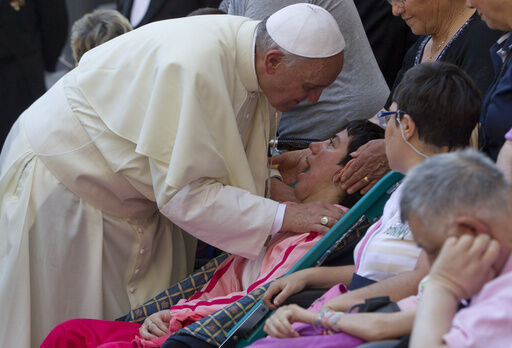Pope Francis' lasting legacy is his championing of the poor, the sick, and the forgotten

It is fitting that the Pope died peacefully just hours after touring St Peter’s Square in the Popemobile to the delight of the many pilgrims and visitors who had travelled to the Vatican for Easter ceremonies. Picture: AP /Gregorio Borgia
At one level, Pope Francis died as he lived: simply and without fuss. The short statement from the Vatican early on Easter Monday noted the Pontiff had “returned to the Father’s house” — a reference to his profound belief it is the world to come that matters more than this world.
At another level, his death was very public. And with hindsight, his whispered blessing "to the city and to the world" on Easter Sunday was a sort of goodbye to the world’s 1.4 billion Catholics.
When he was released from hospital just weeks ago having survived double pneumonia, doctors prescribed a strict two months of convalescence. Of course, they knew this wasn’t his style — and within days, he was being wheeled around St Peter’s Basilica with a tank of oxygen greeting the faithful. It wasn’t that he rejected the advice, it was more that he valued the need to be with people, and lead people and inspire them.
Pope Francis was a man comfortable in his own skin. He wasn’t afraid of vulnerability, sickness or infirmity — and he wasn’t going to allow them to keep him from his ministry: being with and for people.

It is fitting, therefore, that the Pope died peacefully just hours after touring St Peter’s Square in the Popemobile to the delight of the many pilgrims and visitors who had travelled to the Vatican for Easter ceremonies.
As we begin to reflect more deeply on the legacy of Pope Francis, the contours of a pontificate shaped by humility, gentle reform, and pastoral outreach come into sharper focus.
When white smoke billowed from the Sistine Chapel chimney on March 13, 2013, few could have predicted the kind of papacy that would follow. Pope Francis emerged onto the balcony of St Peter's Basilica with a quiet wave and a simple request: "Pray for me."
It was a moment of disarming humility that set the tone for what would become a deeply pastoral and people-centred papacy.
Francis’ focus was consistently on the margins — the poor, the sick, the forgotten. He championed what he called a "Church for the poor" insisting shepherds must smell like their sheep. His first trip outside Rome was to the island of Lampedusa, where he mourned the deaths of migrants crossing the Mediterranean.

The gesture foreshadowed one of the defining themes of his papacy: a tireless advocacy for migrants and refugees in an increasingly divided world.
He spoke often of economic inequality, critiqued the “globalisation of indifference” and offered stinging rebukes of unrestrained capitalism.
His 2015 encyclical Laudato Si’, addressing environmental degradation and climate change, marked a significant moment in the Church’s engagement with contemporary global challenges. It was hailed by environmentalists and policymakers alike.
Internally, Pope Francis has pursued ambitious reforms aimed at increasing transparency and accountability within the Vatican bureaucracy, known as the Curia.
Beyond Church walls, Pope Francis has emerged as a moral leader on the world stage. His addresses to the United Nations, the US Congress, and the European Parliament have been widely lauded for their moral clarity and urgent call to action on behalf of the vulnerable.
Francis also prioritised interfaith dialogue, building bridges with Muslim, Jewish, Buddhist, and other religious leaders. In 2019, he co-signed the historic Document on Human Fraternity with Grand Imam Ahmed el-Tayeb, calling for peace, coexistence, and mutual understanding between Christians and Muslims — a move heralded as a milestone in Christian-Muslim relations.

Like his predecessors, Pope Francis has had to contend with the ongoing fallout of the clerical sexual abuse crisis. While he initially drew criticism for perceived inaction, especially in high-profile cases such as that of Chilean bishop Juan Barros, he has since taken stronger measures.
Yet critics argue while the frameworks have improved, implementation remains inconsistent. Survivors and advocates continue to push for greater transparency and justice, underscoring one of the most persistent and painful challenges of Francis’ pontificate.
Francis disappointed liberals, who mistook his pastoral openness as a signal the Pontiff wanted to change core Church teachings. On this, Francis was clear: asked in a recent interview about the ordination of women, he replied with a simple "no".
He passionately wanted a Church that was more inclusive, but he was clear: the Church must be the Church, and will not abandon core Church teaching simply to make it more palatable to a world that finds it hard to stomach.
Synodality — sharing responsibility within the Church — was, for Francis, a way to engage everyone in the Church in spreading the gospel. He did not see it through the lens of power, but through the lens of service — particularly to the poor and the powerless.
Perhaps his most lasting impact lies not in doctrinal shifts, but in tone and emphasis. Francis has reoriented the papacy around mercy, dialogue, and accompaniment. He has offered a model of leadership grounded in humility and has urged the Church to be, above all, close to the people it serves.
In the end, Pope Francis may be remembered less for changing Church teaching than for changing its posture. From the slums of Buenos Aires to the halls of the Vatican, his voice has been one of conscience — challenging the faithful to care more, to judge less, and to walk with those on the margins.
He was dutiful to the end, presiding over Easter ceremonies before retiring to what would become his death bed. May he rest in peace.
- Michael Kelly is director of public affairs with the papal charity Aid to the Church in Need, Ireland, an expert on Vatican affairs and has covered papal transitions in 2005 and 2013





